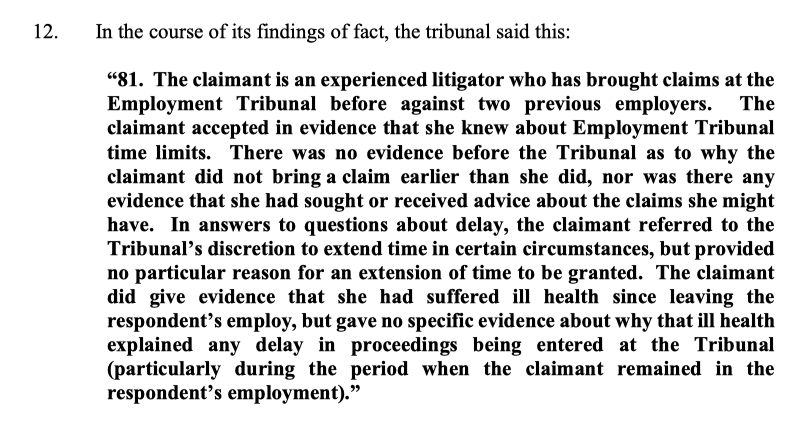
1/ Concentric v Obi: EAT finds an ET can extend time under s.123 EqA w/o there being any reason for the lateness, & where extension would bring in historic matters the ET should apply the Adedeji forensic prejudice approach (but see Tweet 12 for a novel suggestion).
#ukemplaw
#ukemplaw
2/ O worked at the R's outsourced call centre. She brought an ET claim in which she raised a number of claims of sexual harassment. At trial, the ET found 3 of these occurred & that they were part of a continuing act, whilst a racial harassment incident was a one-off.
3/ O's claim was brought 1 day out of time as regards the final sexual harassment act.
The ET found it just & equitable to extend time. This was in spite of finding O knew the time limits well, & the lack of any evidence about why she didn't bring the claim earlier.

The ET found it just & equitable to extend time. This was in spite of finding O knew the time limits well, & the lack of any evidence about why she didn't bring the claim earlier.


4/ 1 ground of appeal asserted the ET erred in extending time where no reason was given for the delay. The parties were in dispute about where the precedent settled on this, with O asserting that after Morgan no reason was needed, & the R suggesting Morgan didn't go that far. 



5/ As can be seen from para 30, the R's position was that in Morgan the CA said you could allow an extension absent a reason being advanced because the ET might identify a reason from all the evidence.
6/ The EAT disagreed, noting the clear breadth of the Morgan approach, and taking comfort from similar comments on the breadth of the discretion in Adedeji and in cases cited in Adedeji. An ET can thus find no reason for delay yet that the discretion may be exercised. 





7/ The 2nd ground of appeal was that the ET erred in focussing on the fact the claim was only 1 day out of time, without having due regard to the forensic prejudice to R where the extension would bring into time far more historic acts. 

8/ The R also bemoaned the inconsistency between the ET finding it just & equitable in that context to extend time for historic sexual harassment acts, having found it not just & equitable to extend time for the racial harassment act, which occurred at the same time. 

10/ The EAT found that, consistently with Adedeji, it would be an error for an ET to fail to consider the potential forensic prejudice arising from the historical allegations that would be brought in as claims were an extension of time allowed. 

11/ HHJ Auerbach postulated the possibility that an ET faced with discrete incidents amounting to a course of conduct might legitimately only extend time for the most recent incident on a stand alone basis rather than either extending for all or declining to extend for all. 

12/ Those comments were strictly obiter, as the ET in this case hadn't conducted the Adedeji exercise, but had only considered the prejudice of bringing the claim 1 day out of time.
It will be interesting to see to what extent EJs are tempted to apply HHJ Auerbach's suggestion.
It will be interesting to see to what extent EJs are tempted to apply HHJ Auerbach's suggestion.
13/ For those who've read the thread, here's the reward of a link to the judgment:
assets.publishing.service.gov.uk/media/63340179…
assets.publishing.service.gov.uk/media/63340179…
• • •
Missing some Tweet in this thread? You can try to
force a refresh








